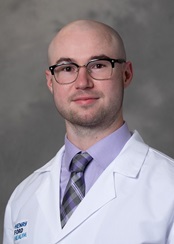2023 SAEMF/RAMS Resident Research Grant - $5,000
"Resuscitation of Severely Bleeding Patients Guided by Resonant Acoustic Rheometry"
Aberrant hemostasis is common in severe trauma, pregnancy-related hemorrhagic conditions, liver failure/transplantation, and other critical illnesses that commonly first present to the emergency department. Resonant acoustic rheometry (RAR) has the potential to provide a rapid, complete assessment of coagulation monitoring for medical and surgical patient populations. With further validation, RAR could improve current methods of guiding blood component therapy and ultimately reduce costs, mitigate risk, and reduce mortality.
Recipient(s)
-

Connor M. Bunch, MD
Henry Ford Hospital
"Resuscitation of Severely Bleeding Patients Guided by Resonant Acoustic Rheometry"
Dr. Bunch is resident physician in the combined emergency medicine/internal medicine at Henry Ford Hospital in Detroit, Michigan. His research interests include the resuscitation of the undifferentiated critically ill patient in the emergency room and the care thereafter in the intensive care unit. More specifically, Dr. Bunch’s research applies point-of-care viscoelastic hemostatic assays (e.g., thromboelastography [TEG], resonant acoustic rheometry [RAR]) to guide individualized blood component ratios and hemostatic adjuncts for severely hemorrhaging and/or coagulopathic patients. This interest sparked in medical school under the guidance of the legendary Dr. Mark Walsh wherein, early in the pandemic when clinicians were bereft of evidence, he was applying TEG to guide anticoagulant therapy and prevent bleeding/thromboses for inpatients with COVID-associated coagulopathy.
Since, then Dr. Bunch’s interests have expanded to goal-directed massive transfusion, tertiary hemostasis, shock-induced endotheliopathy, trauma-induced coagulopathy, sepsis-induced coagulopathy, post-cardiac arrest syndrome-associated coagulopathy, and anticoagulant reversal — areas where the early diagnosis and reversal of deranged blood viscosity, clot formation and termination, and endotheliopathy may enable optimization of macro- and microvascular blood flow to prevent further organ dysfunction/failure for the patient in shock.
